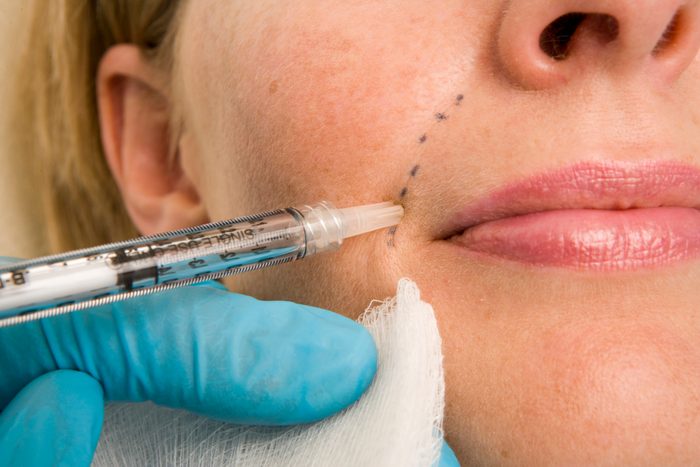What is body dysmorphic disorder?
People with body dysmorphic disorder (BDD) feel compelled to continually analyze and criticize their own appearance. They can’t control their negative thoughts, according to the Anxiety and Depression Association of America. Sufferers will fixate on flaws that their friends and family would view as either slight imperfections or even non-existent. BDD isn’t gender-specific; both men and women battle this disorder. In men, BDD can lead to obsessions with their build, fitness, and height.
According to Ashwini Nadkarni, MD, a psychiatrist and instructor at Harvard Medical School, it’s important to distinguish BDD from eating disorders. “Psychologically, these patients have a tendency to experience deep shame, low self-esteem, and self-loathing.” The difference between BDD and eating disorders is that an eating disorder diagnosis requires eating to be impaired. (The same is not said for BDD.) Many symptoms can be a clue that something is wrong.

You are incredibly self-conscious
People who have BDD often think about their perceived flaws for many hours every day, according to the Anxiety and Depression Association of America. They might believe they have a bulbous or crooked nose, for example, or a lumpy stomach. Others with BDD might be generally dissatisfied with their entire body. BDD is an obsession that can lead sufferers to spend hours in front of a mirror or studying photos of themselves. (Read through these body-positive quotes to remind yourself that all bodies are beautiful.)

You have an unreal perception of your body
For example, a woman might “feel” fat even if her weight is considered completely normal for her height. “Those suffering from BDD will believe they look different than they appear,” according to licensed clinical social worker Edie Stark, MS, a psychotherapist and body image expert. When she asks people with BDD to draw an outline of their body, the picture will be distorted from reality. “It will match how the person views themselves,” Dr. Stark says. (Here are great ways to boost your body image.)

You struggle with compulsive behavior
Victims tend to develop compulsive ticks that can be mental or physical, explains psychologist Jana Scrivani. They might groom themselves excessively, pick at skin bumps, or constantly check the mirror. When in a room, they might always look around and compare themselves to other people. For example, it could be that their “obsession” that they have a certain flaw leads them to the “compulsion” to compare themselves to others in the room with them in order to alleviate the anxiety. While the behavior might temporarily ease their feelings of anxiousness, explains Scrivani, the behavior is akin to obsessive-compulsive disorder. (These are the OCD symptoms you should be aware of.)

Your personal and professional relationships take a hit
BDD symptoms consume many hours of a sufferer’s time each day. A sufferer’s efforts to change or conceal the flaw are hardwired into the brain almost like a survival instinct, according to Jodi Jaspan, body image expert and program director at The Light Program and Seeds of Hope. BDD can take a toll on jobs, education, romantic relationships, and even family ties—especially if the sufferer refuses to get help. This is a sensitive way to suggest that someone needs therapy.

You constantly seek reassurance or approval from others
You can tell a person with BDD over and over again that they’re not overweight or that their nose isn’t big, but they are unable to see reality. “This obsession with the flawed body part greatly affects their relationships because they are afraid that others are judging them, and they avoid intimacy because they are afraid that a partner will be repulsed,” says licensed social worker Levana Slabodnick of Silverlinings Psychotherapy. This fear results in a constant need for reassurance, but with slim chances of satisfaction. (Here are instant self-confidence boosters to help you feel more sure of yourself.)

You spend too much on cosmetic surgery to “cure” the flaw
Recurring nose jobs, skin whitening, and tummy tucks are also common red flags, warns Joshua D. Zuckerman, MD, board-certified plastic surgeon in New York City. This can actually worsen BDD symptoms and lead to physical danger from too many procedures, Dr. Zuckerman says. “I occasionally encounter cosmetic surgery patients who are too fixated on a particular aspect of their appearance. For example, a person who strongly wishes to undergo liposuction but doesn’t physically have the fat to remove, or a rhinoplasty patient very focused on some small aspect of their nose that is well within the range of normal.”

You’re always dieting and working out
As self-criticism escalates, victims turn to extreme measures to compensate for whatever flaws they think exist. “This may mean that a person exercises or diets excessively to lose weight they think they have gained, or a person takes protein and lifts weights to become ‘big enough,’ even if he appears to be very muscular to others,” says Ariane Machin, PhD, psychologist and body image expert. This mindset can quickly spiral into eating disorders, like anorexia and bulimia, and/or over-exercise. (Here’s what a body image coach wishes you knew.)

Your work and leisure life suffer
In order to meet the criteria for a BDD diagnosis, your symptoms must be significant enough to impact your home, school, or work life. If your grooming ritual eats up so much time that you’re continually late for work, or your weight obsession leads you to avoid friends and family, you could be at risk. Constantly fixating on your perceived flaws will interfere with your ability to focus on other topics, according to Slabodnick. That can prevent you from fully engaging in everyday activities—and it may be time to seek treatment. (Check out these everyday things that could trigger anxiety.)

Treatment
Being able to recognize when your self-improvement has become an obsession is a difficult but crucial step in BDD. Cognitive-behavioral therapy is the only type of psychological treatment for BDD that is supported by research, according to the International OCD Foundation. This teaches people to recognize potential BDD triggers and to reframe negative thoughts into more positive ones. The medical treatment of choice according to a report in the Official Journal of The World Psychiatric Association, is a type of antidepressant called selective serotonin reuptake inhibitors (SSRIs). Many doctors recommend a combination of both treatments. Next, learn about the signs you might have an anxiety disorder.

